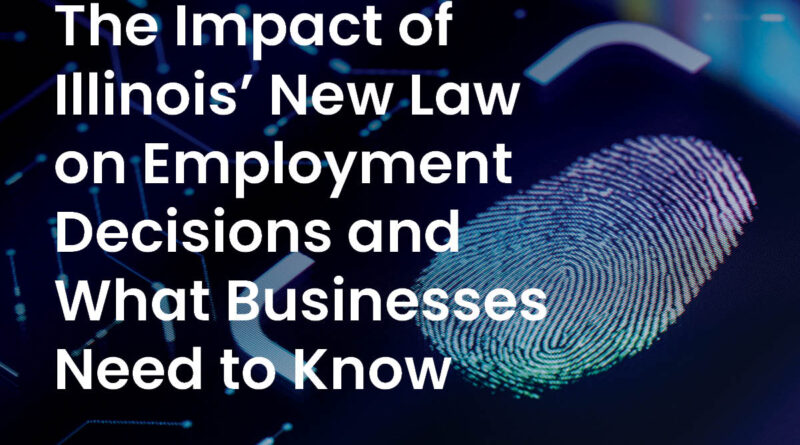AI in Hiring: The Impact of New Illinois Law on Employment Decisions and What Businesses Need to Know – Spencer Fane
On August 9, 2024, Illinois Governor JB Pritzker signed HB 3773 into law, marking a significant step toward regulating the use of artificial intelligence (AI) in the workplace. Effective January 1, 2026, this amendment to the Illinois Civil Rights Act sets forth strict guidelines for employers using AI in recruiting, hiring and other employment decisions.
Important Legal Provisions
The Illinois Civil Rights Act currently prohibits employers, employers, and unions from discriminating based on protected characteristics such as race, gender, age, and others. Specifically, HB 3773 extends this protection to make it a crime for employers to use AI in a way that causes discrimination. This includes using AI tools that can influence decisions about hiring, promotion, or other work-related issues.
An important part of the new law is the requirement for employers to inform employees if AI is used in these processes. Although the bill does not specifically address job seekers, the references to “employment” and “employment” suggest that AI-related protections may extend to them as well.
Understanding AI Legally
Under Illinois law, “artificial intelligence” is defined to be the same as the Colorado AI Act’s definition of “artificial intelligence system,” which it defines as a machine-based system that interprets input to produce a result, such as predictions or decisions, which may affect physical or real situations. The law also defines separately “artificial intelligence”.
Performance and Compliance
The Illinois Department of Human Rights and the Illinois Human Rights Commission will enforce the law. Remedies for violations may include back wages, lost benefits, reinstatement, and attorneys’ fees, among other compensation.
Unlike the Colorado AI Act, Illinois does not mandate risk management strategies or AI impact assessments. However, companies are advised to adopt these methods voluntarily to reduce the risk of discrimination when deploying AI in the workplace.
Effective Compliance Measures
Businesses that are currently using AI in their work processes or are considering using it should adopt the following best practices:
- Review and Evaluate Current AI Tools: Conduct a thorough review of all AI systems currently in use for hiring, promotion, or other employment-related decisions. Check whether these tools can lead to unfair results or illegal discrimination.
- Ensure Notification Monitoring: Establish clear policies to notify employees and applicants when AI is used for recruiting or hiring purposes. This includes providing full disclosure in handbooks or publications as may be required by law.
- Conduct Regular Audits: Periodically audit AI systems to detect and correct any biases. This could include testing AI results against different groups of people to ensure fairness and compliance with anti-discrimination laws.
- Training and Education: Train HR staff and others involved in the hiring process on new legal requirements and the appropriate use of AI. Make sure they understand how AI tools work and the importance of compliance.
- Document Everything: Keep detailed records of how AI tools are used, including decision-making processes, notifications given to employees, and any steps taken to ensure compliance. These documents will be important if legal problems arise.
- Review Contracts: Before implementing and/or renewing your contracts with service providers who may provide AI-enabled services, be sure to review the contract carefully with a reputable technology advisor. ensure that there is reasonable security for your company, including but not limited to. that the seller must comply with applicable laws, and that he understands all legal risks.
- Don’t Over-Trust AI: AI-powered software is always unreliable and unpredictable, and in some cases, fake results. AI should be used as a tool but should not be over-relied; otherwise, it creates more risks for businesses. The increase in cases is expected based on the excessive reliance of companies on AI-supported services that may lead to discriminatory results for job applicants.
- Review Insurance Policies: Review the insurance coverage your company has for work-based claims, including what exclusions there may be.
The end
As AI continues to evolve, so do the regulatory landscape. Illinois employers need to prepare for these changes by reviewing their AI tools and ensuring they are in compliance with the new law to avoid potential legal pitfalls. Although Colorado was the first state to pass laws dealing with discrimination based on AI, it is clear that many other states will follow suit.
This blog was created by Jack Amaral and Jon Farnsworthtechnology and privacy attorneys in the Minneapolis, Minnesota, office of Spencer Fane, and Toni Ojoyeyilabor and employment attorney in the firm’s Nashville, Tennessee office. For more information, please visit spencerfane.com.
Click Here subscribing to Spencer Fane’s newsletter ensures you get timely updates like this straight to your inbox.
#Hiring #Impact #Illinois #Law #Employment #Decisions #Businesses #Spencer #Fane
